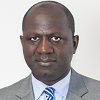In 2014, the African Union’s “Cost of Hunger” study alerted African ministers of finance and planning to an underappreciated economic headwind that was gaining strength and threatening to stall their development plans. Yet even as the silent hunger pandemic and the current COVID-19 pandemic erode Africa’s human capital, policymakers and political leaders still have not put health at the center of their recovery plans.
Chronic malnutrition and COVID-19 present the same challenge at different scales. The coronavirus suspended the prevailing economic model and reminded us that capital ultimately depends on the health of the laborers who expand and mobilize resources. Likewise, hunger undercuts productivity by eroding human capital over time.
In countries where health is recognized as an enabler of economic transformation, these issues are not siloed off in the health ministry. From the Ebola outbreak in West Africa to COVID-19, we now have a clear understanding of how domestic resources can be mobilized to address public-health emergencies. In the United States and other advanced economies, the government has tapped into the country’s wealth to support large-scale social policies like household stimulus checks and wage support schemes. But countries need not be rich: In Togo, the government’s Novissi initiative has extended support to informal workers.
The success of such programs ultimately depends on the extent to which a government can draw on its agricultural and industrial bases. The more that a country fosters innovation, the more options its government will have for resolving social, environmental, and public-health issues.
Unlike Ebola, whose rural origins reinforced the push for economic development through urbanization, COVID-19 struck directly at Africa’s densely populated cities, restricting our ability to generate the resources that are essential to our economies. And because we have kept a rent-seeking development model, the closure of borders prevented countries from moving goods and generating revenues from raw-materials exports.
To reap the largest economic dividends from health and other human-capital investments, policies must be designed with specific, measurable goals in mind. For example, Africa, which pays $14 billion per year for imported pharmaceuticals, would have fared much better in the pandemic if it had invested more in local pharmaceutical manufacturing capacity.
Moreover, the Ebola crisis should have already compelled African policymakers to view health care as a central pillar of infrastructure investment. Africa has what McKinsey & Company calls an “infrastructure paradox”: “there is need and available funding … but not enough money is being spent.” While governments fixate on plans for brick-and-mortar projects, they struggle to maintain and upgrade the health infrastructure needed to ensure that people can bring these to fruition.
In fact, human-capital infrastructure of all kinds (including health, education, and social services) is more important than ever. Pandemic-driven innovations to resolve temporary issues (such as solar-powered hand-washing basins and medical robots) will not be enough to change the broader policy dispensation. We also must inscribe this innovative spirit into long-term policy programs so that all African men and women can develop and apply their skills and creativity when these assets are most needed.
Such investment is critical, because it is human capital that will provide the strongest cushion in future crises, especially those that overwhelm social safety nets. While safety nets provide resilience, it is innovation that drives prosperity and creates the surplus resources needed for hard times. We cannot expect help from others when we have not even taken it upon ourselves to prepare for crises that we long saw coming. Africans must use the response to the pandemic to start innovating out of donor dependency.
We know that it is possible to leverage human capital into prosperity, because China has done it in the space of just two generations. As of 2021, Africa has 1,900 epidemiologists but needs 6,000, and fewer than 5,000 front-line responders when it needs 25,000. For a continent of 1.2 billion people – most of them young – the supply of qualified, healthy personnel should not be an issue. Demography is working in our favor, and yet we struggle to connect the dots by putting human capital at the heart of our development strategies.
After hitting “snooze” with Ebola, African policymakers, private-sector leaders, and civil-society representatives have been given another wake-up call with COVID-19. Governments must provide strategic direction so that entrepreneurs and industries are not operating in isolation or at cross purposes. Only with a healthy workforce can Africans take full advantage of the new African Continental Free Trade Area, moving beyond the inefficient arrangement of 54 fragmented frameworks.
With such a large youth population, we must focus on promoting health and expanding employment. Africa’s young people are tech savvy, entrepreneurial, and eager to generate prosperity for their communities. But today’s leaders must take action to keep the flame of innovation burning. By investing in their people, they can add dynamism to African agriculture, industry, and services. The wealth this generates will cushion the blow when the next crisis arrives.
Carl Manlan, a 2016 New Voices Fellow at the Aspen Institute, is Chief Operating Officer at the Ecobank Foundation.
Copyright: Project Syndicate, 2021. www.project-syndicate.org










